Effect of Zero-hour Contracts on Staff Motivation and Service Quality
VerifiedAdded on 2020/02/03
|15
|5278
|47
Report
AI Summary
This report presents a comprehensive analysis of the impact of zero-hour contracts on staff motivation and the resulting effect on service quality, using Mrs. Gills Kitchen in Tottenham, London, UK, as a case study. The research explores the concept of zero-hour contracts, their influence on employee motivation, and their subsequent impact on the quality of services delivered. The study employs an interpretivist research philosophy and an inductive approach, utilizing qualitative research methods to gather data. The objectives include identifying the concept of zero-hour contracts, assessing their impact on employee motivation, evaluating their effect on service quality, and recommending strategies for enhancing workforce motivation. The research methodology encompasses a literature review, research questions, and a detailed discussion of research philosophies, approaches, and methods, including sampling and data analysis techniques. The report aims to provide insights into the challenges posed by zero-hour contracts and suggests practical solutions for improving employee motivation and service quality within the hospitality industry.
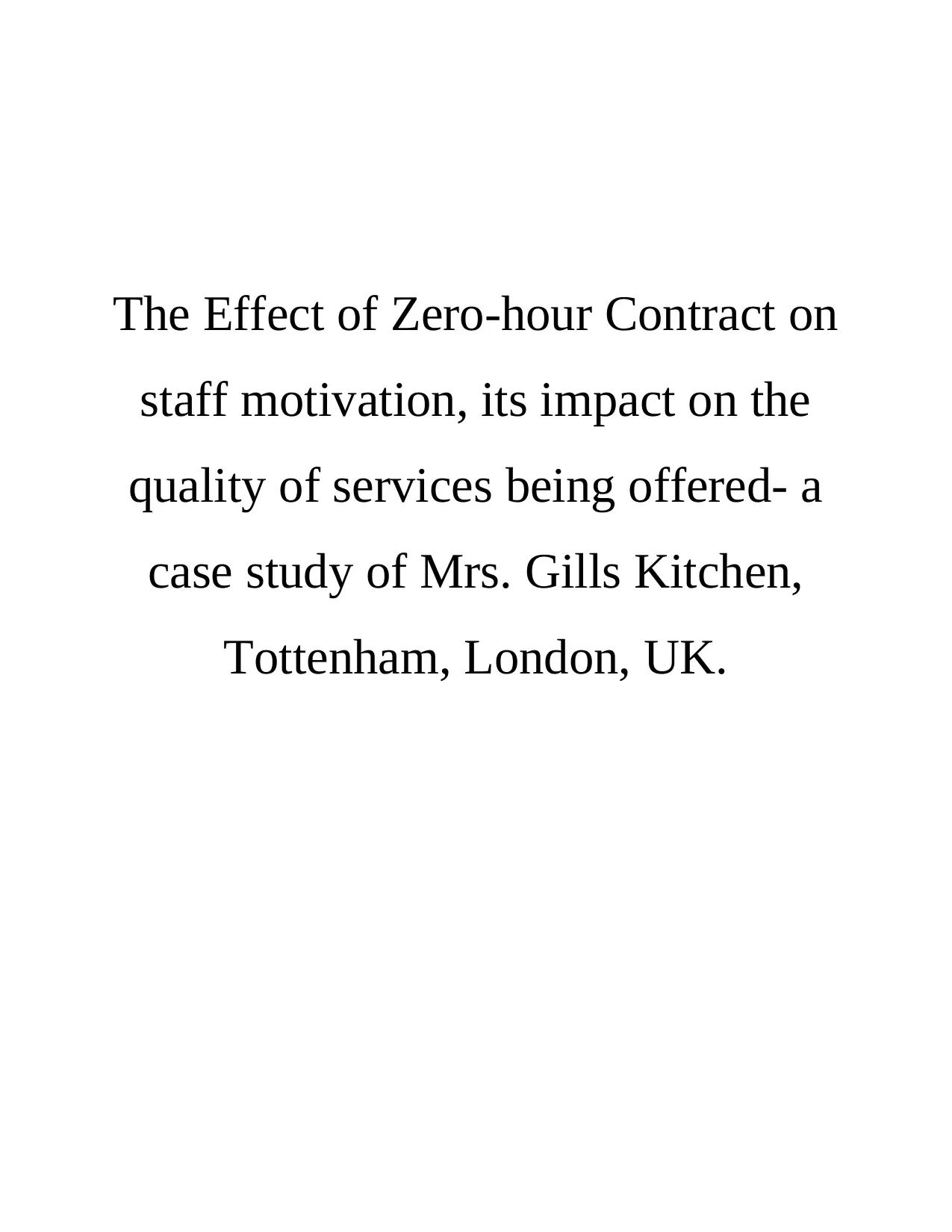
The Effect of Zero-hour Contract on
staff motivation, its impact on the
quality of services being offered- a
case study of Mrs. Gills Kitchen,
Tottenham, London, UK.
staff motivation, its impact on the
quality of services being offered- a
case study of Mrs. Gills Kitchen,
Tottenham, London, UK.
Paraphrase This Document
Need a fresh take? Get an instant paraphrase of this document with our AI Paraphraser
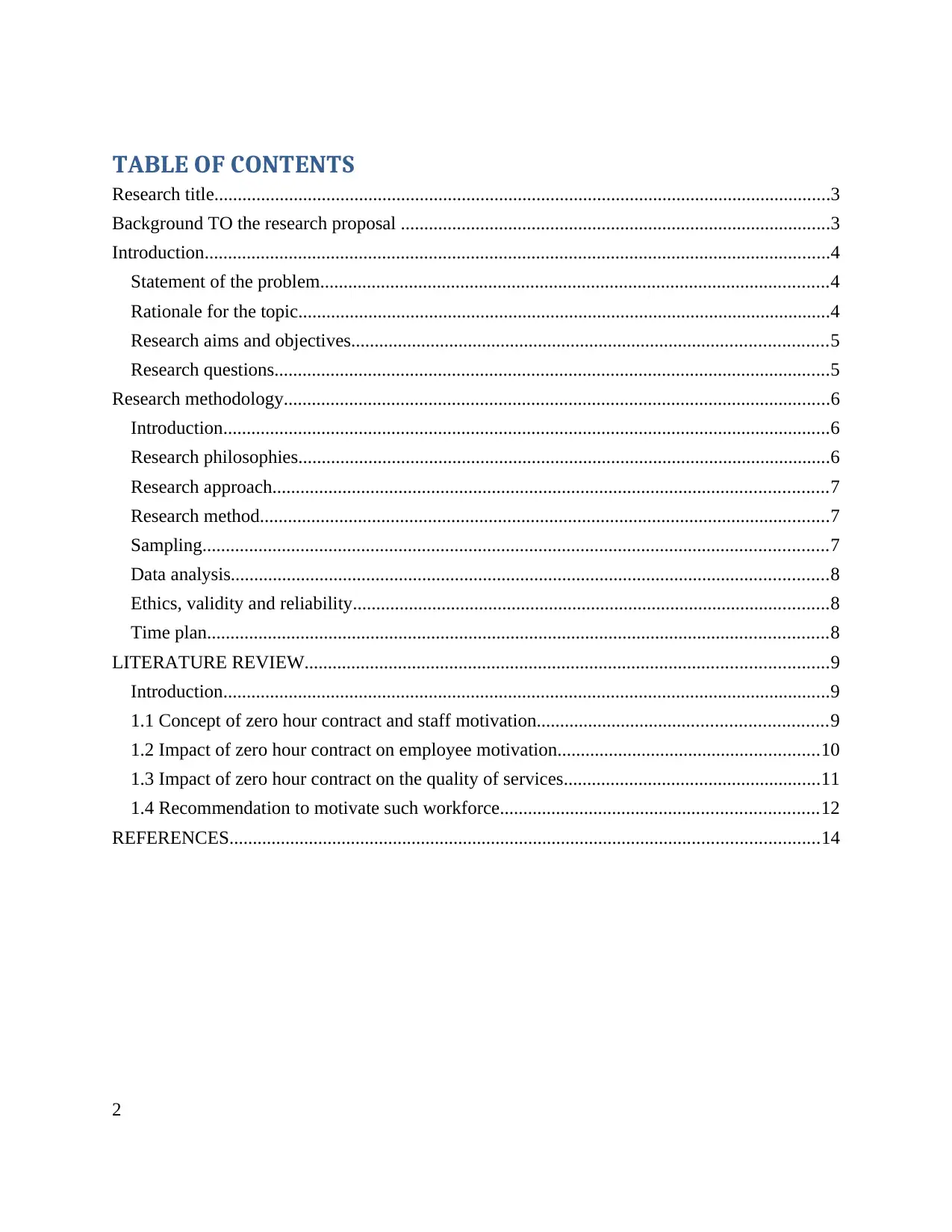
TABLE OF CONTENTS
Research title....................................................................................................................................3
Background TO the research proposal ............................................................................................3
Introduction......................................................................................................................................4
Statement of the problem.............................................................................................................4
Rationale for the topic..................................................................................................................4
Research aims and objectives......................................................................................................5
Research questions.......................................................................................................................5
Research methodology.....................................................................................................................6
Introduction..................................................................................................................................6
Research philosophies..................................................................................................................6
Research approach.......................................................................................................................7
Research method..........................................................................................................................7
Sampling......................................................................................................................................7
Data analysis................................................................................................................................8
Ethics, validity and reliability......................................................................................................8
Time plan.....................................................................................................................................8
LITERATURE REVIEW................................................................................................................9
Introduction..................................................................................................................................9
1.1 Concept of zero hour contract and staff motivation..............................................................9
1.2 Impact of zero hour contract on employee motivation........................................................10
1.3 Impact of zero hour contract on the quality of services.......................................................11
1.4 Recommendation to motivate such workforce....................................................................12
REFERENCES..............................................................................................................................14
2
Research title....................................................................................................................................3
Background TO the research proposal ............................................................................................3
Introduction......................................................................................................................................4
Statement of the problem.............................................................................................................4
Rationale for the topic..................................................................................................................4
Research aims and objectives......................................................................................................5
Research questions.......................................................................................................................5
Research methodology.....................................................................................................................6
Introduction..................................................................................................................................6
Research philosophies..................................................................................................................6
Research approach.......................................................................................................................7
Research method..........................................................................................................................7
Sampling......................................................................................................................................7
Data analysis................................................................................................................................8
Ethics, validity and reliability......................................................................................................8
Time plan.....................................................................................................................................8
LITERATURE REVIEW................................................................................................................9
Introduction..................................................................................................................................9
1.1 Concept of zero hour contract and staff motivation..............................................................9
1.2 Impact of zero hour contract on employee motivation........................................................10
1.3 Impact of zero hour contract on the quality of services.......................................................11
1.4 Recommendation to motivate such workforce....................................................................12
REFERENCES..............................................................................................................................14
2
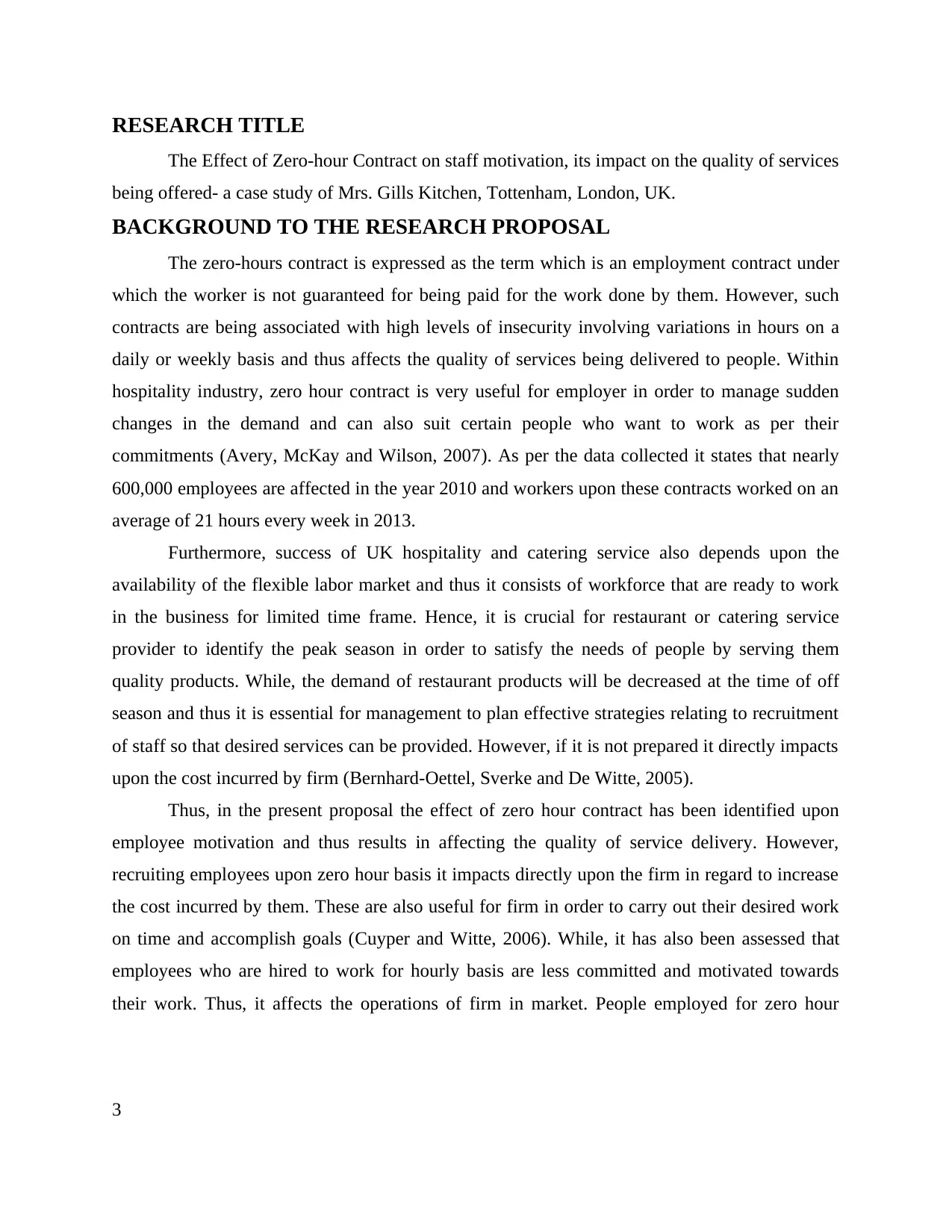
RESEARCH TITLE
The Effect of Zero-hour Contract on staff motivation, its impact on the quality of services
being offered- a case study of Mrs. Gills Kitchen, Tottenham, London, UK.
BACKGROUND TO THE RESEARCH PROPOSAL
The zero-hours contract is expressed as the term which is an employment contract under
which the worker is not guaranteed for being paid for the work done by them. However, such
contracts are being associated with high levels of insecurity involving variations in hours on a
daily or weekly basis and thus affects the quality of services being delivered to people. Within
hospitality industry, zero hour contract is very useful for employer in order to manage sudden
changes in the demand and can also suit certain people who want to work as per their
commitments (Avery, McKay and Wilson, 2007). As per the data collected it states that nearly
600,000 employees are affected in the year 2010 and workers upon these contracts worked on an
average of 21 hours every week in 2013.
Furthermore, success of UK hospitality and catering service also depends upon the
availability of the flexible labor market and thus it consists of workforce that are ready to work
in the business for limited time frame. Hence, it is crucial for restaurant or catering service
provider to identify the peak season in order to satisfy the needs of people by serving them
quality products. While, the demand of restaurant products will be decreased at the time of off
season and thus it is essential for management to plan effective strategies relating to recruitment
of staff so that desired services can be provided. However, if it is not prepared it directly impacts
upon the cost incurred by firm (Bernhard-Oettel, Sverke and De Witte, 2005).
Thus, in the present proposal the effect of zero hour contract has been identified upon
employee motivation and thus results in affecting the quality of service delivery. However,
recruiting employees upon zero hour basis it impacts directly upon the firm in regard to increase
the cost incurred by them. These are also useful for firm in order to carry out their desired work
on time and accomplish goals (Cuyper and Witte, 2006). While, it has also been assessed that
employees who are hired to work for hourly basis are less committed and motivated towards
their work. Thus, it affects the operations of firm in market. People employed for zero hour
3
The Effect of Zero-hour Contract on staff motivation, its impact on the quality of services
being offered- a case study of Mrs. Gills Kitchen, Tottenham, London, UK.
BACKGROUND TO THE RESEARCH PROPOSAL
The zero-hours contract is expressed as the term which is an employment contract under
which the worker is not guaranteed for being paid for the work done by them. However, such
contracts are being associated with high levels of insecurity involving variations in hours on a
daily or weekly basis and thus affects the quality of services being delivered to people. Within
hospitality industry, zero hour contract is very useful for employer in order to manage sudden
changes in the demand and can also suit certain people who want to work as per their
commitments (Avery, McKay and Wilson, 2007). As per the data collected it states that nearly
600,000 employees are affected in the year 2010 and workers upon these contracts worked on an
average of 21 hours every week in 2013.
Furthermore, success of UK hospitality and catering service also depends upon the
availability of the flexible labor market and thus it consists of workforce that are ready to work
in the business for limited time frame. Hence, it is crucial for restaurant or catering service
provider to identify the peak season in order to satisfy the needs of people by serving them
quality products. While, the demand of restaurant products will be decreased at the time of off
season and thus it is essential for management to plan effective strategies relating to recruitment
of staff so that desired services can be provided. However, if it is not prepared it directly impacts
upon the cost incurred by firm (Bernhard-Oettel, Sverke and De Witte, 2005).
Thus, in the present proposal the effect of zero hour contract has been identified upon
employee motivation and thus results in affecting the quality of service delivery. However,
recruiting employees upon zero hour basis it impacts directly upon the firm in regard to increase
the cost incurred by them. These are also useful for firm in order to carry out their desired work
on time and accomplish goals (Cuyper and Witte, 2006). While, it has also been assessed that
employees who are hired to work for hourly basis are less committed and motivated towards
their work. Thus, it affects the operations of firm in market. People employed for zero hour
3
⊘ This is a preview!⊘
Do you want full access?
Subscribe today to unlock all pages.

Trusted by 1+ million students worldwide
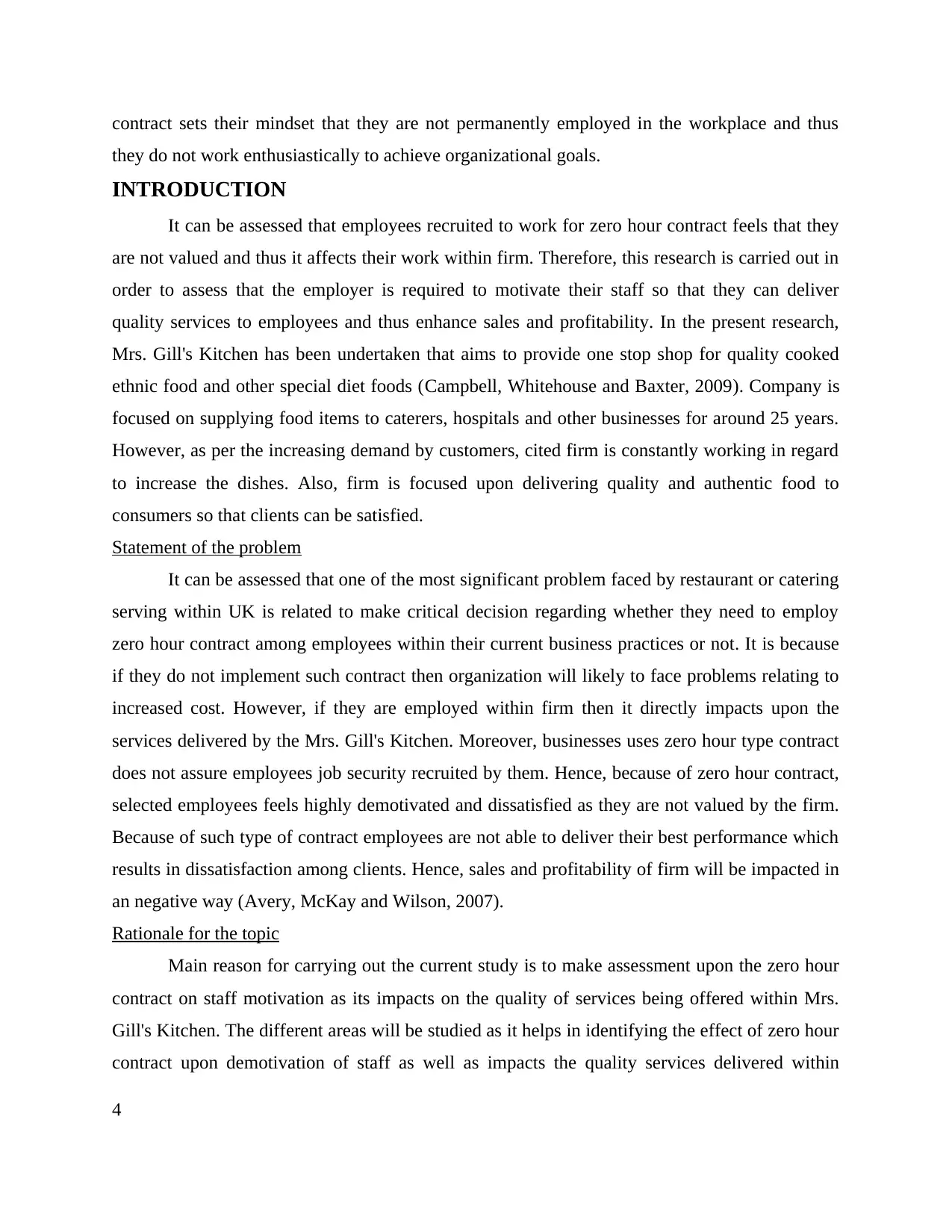
contract sets their mindset that they are not permanently employed in the workplace and thus
they do not work enthusiastically to achieve organizational goals.
INTRODUCTION
It can be assessed that employees recruited to work for zero hour contract feels that they
are not valued and thus it affects their work within firm. Therefore, this research is carried out in
order to assess that the employer is required to motivate their staff so that they can deliver
quality services to employees and thus enhance sales and profitability. In the present research,
Mrs. Gill's Kitchen has been undertaken that aims to provide one stop shop for quality cooked
ethnic food and other special diet foods (Campbell, Whitehouse and Baxter, 2009). Company is
focused on supplying food items to caterers, hospitals and other businesses for around 25 years.
However, as per the increasing demand by customers, cited firm is constantly working in regard
to increase the dishes. Also, firm is focused upon delivering quality and authentic food to
consumers so that clients can be satisfied.
Statement of the problem
It can be assessed that one of the most significant problem faced by restaurant or catering
serving within UK is related to make critical decision regarding whether they need to employ
zero hour contract among employees within their current business practices or not. It is because
if they do not implement such contract then organization will likely to face problems relating to
increased cost. However, if they are employed within firm then it directly impacts upon the
services delivered by the Mrs. Gill's Kitchen. Moreover, businesses uses zero hour type contract
does not assure employees job security recruited by them. Hence, because of zero hour contract,
selected employees feels highly demotivated and dissatisfied as they are not valued by the firm.
Because of such type of contract employees are not able to deliver their best performance which
results in dissatisfaction among clients. Hence, sales and profitability of firm will be impacted in
an negative way (Avery, McKay and Wilson, 2007).
Rationale for the topic
Main reason for carrying out the current study is to make assessment upon the zero hour
contract on staff motivation as its impacts on the quality of services being offered within Mrs.
Gill's Kitchen. The different areas will be studied as it helps in identifying the effect of zero hour
contract upon demotivation of staff as well as impacts the quality services delivered within
4
they do not work enthusiastically to achieve organizational goals.
INTRODUCTION
It can be assessed that employees recruited to work for zero hour contract feels that they
are not valued and thus it affects their work within firm. Therefore, this research is carried out in
order to assess that the employer is required to motivate their staff so that they can deliver
quality services to employees and thus enhance sales and profitability. In the present research,
Mrs. Gill's Kitchen has been undertaken that aims to provide one stop shop for quality cooked
ethnic food and other special diet foods (Campbell, Whitehouse and Baxter, 2009). Company is
focused on supplying food items to caterers, hospitals and other businesses for around 25 years.
However, as per the increasing demand by customers, cited firm is constantly working in regard
to increase the dishes. Also, firm is focused upon delivering quality and authentic food to
consumers so that clients can be satisfied.
Statement of the problem
It can be assessed that one of the most significant problem faced by restaurant or catering
serving within UK is related to make critical decision regarding whether they need to employ
zero hour contract among employees within their current business practices or not. It is because
if they do not implement such contract then organization will likely to face problems relating to
increased cost. However, if they are employed within firm then it directly impacts upon the
services delivered by the Mrs. Gill's Kitchen. Moreover, businesses uses zero hour type contract
does not assure employees job security recruited by them. Hence, because of zero hour contract,
selected employees feels highly demotivated and dissatisfied as they are not valued by the firm.
Because of such type of contract employees are not able to deliver their best performance which
results in dissatisfaction among clients. Hence, sales and profitability of firm will be impacted in
an negative way (Avery, McKay and Wilson, 2007).
Rationale for the topic
Main reason for carrying out the current study is to make assessment upon the zero hour
contract on staff motivation as its impacts on the quality of services being offered within Mrs.
Gill's Kitchen. The different areas will be studied as it helps in identifying the effect of zero hour
contract upon demotivation of staff as well as impacts the quality services delivered within
4
Paraphrase This Document
Need a fresh take? Get an instant paraphrase of this document with our AI Paraphraser
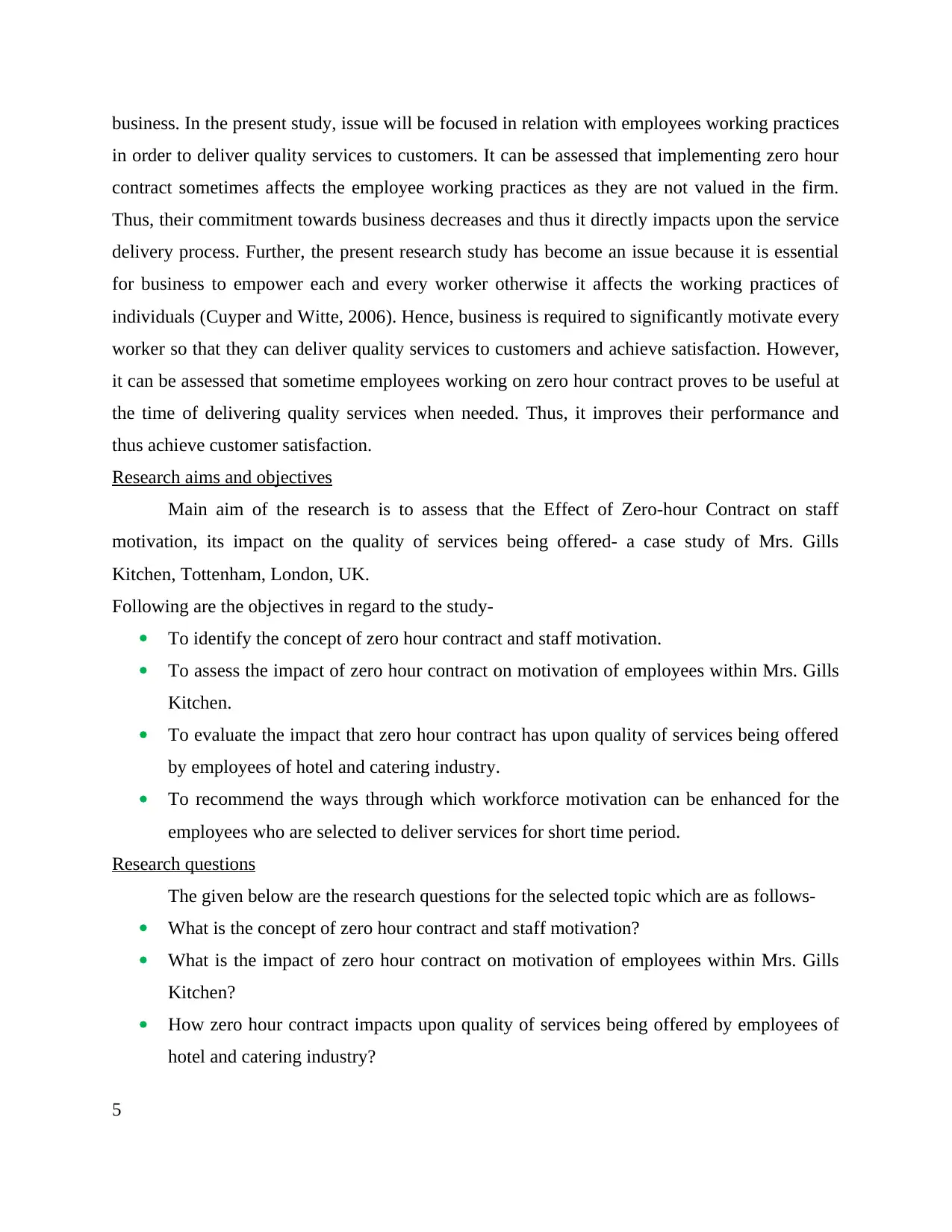
business. In the present study, issue will be focused in relation with employees working practices
in order to deliver quality services to customers. It can be assessed that implementing zero hour
contract sometimes affects the employee working practices as they are not valued in the firm.
Thus, their commitment towards business decreases and thus it directly impacts upon the service
delivery process. Further, the present research study has become an issue because it is essential
for business to empower each and every worker otherwise it affects the working practices of
individuals (Cuyper and Witte, 2006). Hence, business is required to significantly motivate every
worker so that they can deliver quality services to customers and achieve satisfaction. However,
it can be assessed that sometime employees working on zero hour contract proves to be useful at
the time of delivering quality services when needed. Thus, it improves their performance and
thus achieve customer satisfaction.
Research aims and objectives
Main aim of the research is to assess that the Effect of Zero-hour Contract on staff
motivation, its impact on the quality of services being offered- a case study of Mrs. Gills
Kitchen, Tottenham, London, UK.
Following are the objectives in regard to the study-
To identify the concept of zero hour contract and staff motivation.
To assess the impact of zero hour contract on motivation of employees within Mrs. Gills
Kitchen.
To evaluate the impact that zero hour contract has upon quality of services being offered
by employees of hotel and catering industry.
To recommend the ways through which workforce motivation can be enhanced for the
employees who are selected to deliver services for short time period.
Research questions
The given below are the research questions for the selected topic which are as follows-
What is the concept of zero hour contract and staff motivation?
What is the impact of zero hour contract on motivation of employees within Mrs. Gills
Kitchen?
How zero hour contract impacts upon quality of services being offered by employees of
hotel and catering industry?
5
in order to deliver quality services to customers. It can be assessed that implementing zero hour
contract sometimes affects the employee working practices as they are not valued in the firm.
Thus, their commitment towards business decreases and thus it directly impacts upon the service
delivery process. Further, the present research study has become an issue because it is essential
for business to empower each and every worker otherwise it affects the working practices of
individuals (Cuyper and Witte, 2006). Hence, business is required to significantly motivate every
worker so that they can deliver quality services to customers and achieve satisfaction. However,
it can be assessed that sometime employees working on zero hour contract proves to be useful at
the time of delivering quality services when needed. Thus, it improves their performance and
thus achieve customer satisfaction.
Research aims and objectives
Main aim of the research is to assess that the Effect of Zero-hour Contract on staff
motivation, its impact on the quality of services being offered- a case study of Mrs. Gills
Kitchen, Tottenham, London, UK.
Following are the objectives in regard to the study-
To identify the concept of zero hour contract and staff motivation.
To assess the impact of zero hour contract on motivation of employees within Mrs. Gills
Kitchen.
To evaluate the impact that zero hour contract has upon quality of services being offered
by employees of hotel and catering industry.
To recommend the ways through which workforce motivation can be enhanced for the
employees who are selected to deliver services for short time period.
Research questions
The given below are the research questions for the selected topic which are as follows-
What is the concept of zero hour contract and staff motivation?
What is the impact of zero hour contract on motivation of employees within Mrs. Gills
Kitchen?
How zero hour contract impacts upon quality of services being offered by employees of
hotel and catering industry?
5
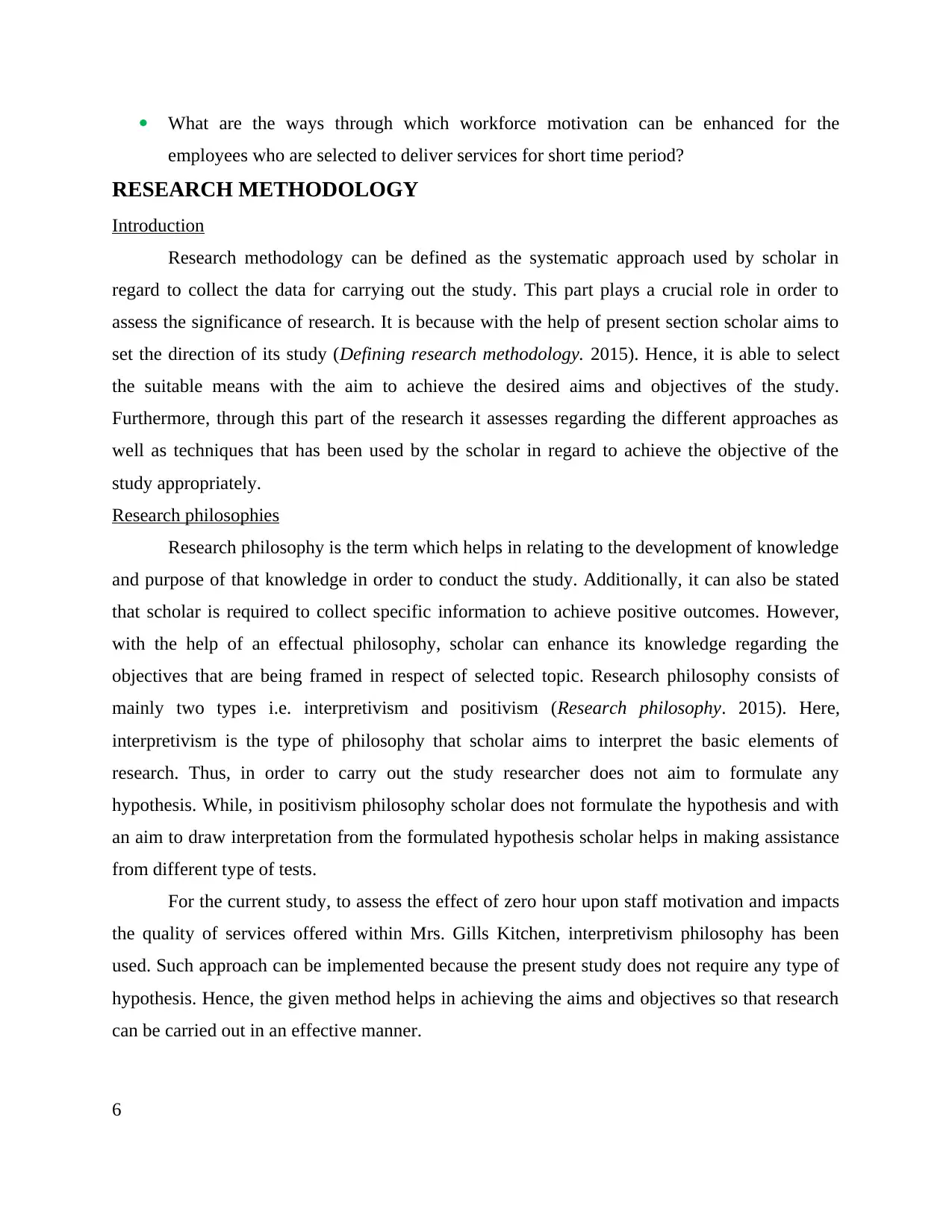
What are the ways through which workforce motivation can be enhanced for the
employees who are selected to deliver services for short time period?
RESEARCH METHODOLOGY
Introduction
Research methodology can be defined as the systematic approach used by scholar in
regard to collect the data for carrying out the study. This part plays a crucial role in order to
assess the significance of research. It is because with the help of present section scholar aims to
set the direction of its study (Defining research methodology. 2015). Hence, it is able to select
the suitable means with the aim to achieve the desired aims and objectives of the study.
Furthermore, through this part of the research it assesses regarding the different approaches as
well as techniques that has been used by the scholar in regard to achieve the objective of the
study appropriately.
Research philosophies
Research philosophy is the term which helps in relating to the development of knowledge
and purpose of that knowledge in order to conduct the study. Additionally, it can also be stated
that scholar is required to collect specific information to achieve positive outcomes. However,
with the help of an effectual philosophy, scholar can enhance its knowledge regarding the
objectives that are being framed in respect of selected topic. Research philosophy consists of
mainly two types i.e. interpretivism and positivism (Research philosophy. 2015). Here,
interpretivism is the type of philosophy that scholar aims to interpret the basic elements of
research. Thus, in order to carry out the study researcher does not aim to formulate any
hypothesis. While, in positivism philosophy scholar does not formulate the hypothesis and with
an aim to draw interpretation from the formulated hypothesis scholar helps in making assistance
from different type of tests.
For the current study, to assess the effect of zero hour upon staff motivation and impacts
the quality of services offered within Mrs. Gills Kitchen, interpretivism philosophy has been
used. Such approach can be implemented because the present study does not require any type of
hypothesis. Hence, the given method helps in achieving the aims and objectives so that research
can be carried out in an effective manner.
6
employees who are selected to deliver services for short time period?
RESEARCH METHODOLOGY
Introduction
Research methodology can be defined as the systematic approach used by scholar in
regard to collect the data for carrying out the study. This part plays a crucial role in order to
assess the significance of research. It is because with the help of present section scholar aims to
set the direction of its study (Defining research methodology. 2015). Hence, it is able to select
the suitable means with the aim to achieve the desired aims and objectives of the study.
Furthermore, through this part of the research it assesses regarding the different approaches as
well as techniques that has been used by the scholar in regard to achieve the objective of the
study appropriately.
Research philosophies
Research philosophy is the term which helps in relating to the development of knowledge
and purpose of that knowledge in order to conduct the study. Additionally, it can also be stated
that scholar is required to collect specific information to achieve positive outcomes. However,
with the help of an effectual philosophy, scholar can enhance its knowledge regarding the
objectives that are being framed in respect of selected topic. Research philosophy consists of
mainly two types i.e. interpretivism and positivism (Research philosophy. 2015). Here,
interpretivism is the type of philosophy that scholar aims to interpret the basic elements of
research. Thus, in order to carry out the study researcher does not aim to formulate any
hypothesis. While, in positivism philosophy scholar does not formulate the hypothesis and with
an aim to draw interpretation from the formulated hypothesis scholar helps in making assistance
from different type of tests.
For the current study, to assess the effect of zero hour upon staff motivation and impacts
the quality of services offered within Mrs. Gills Kitchen, interpretivism philosophy has been
used. Such approach can be implemented because the present study does not require any type of
hypothesis. Hence, the given method helps in achieving the aims and objectives so that research
can be carried out in an effective manner.
6
⊘ This is a preview!⊘
Do you want full access?
Subscribe today to unlock all pages.

Trusted by 1+ million students worldwide
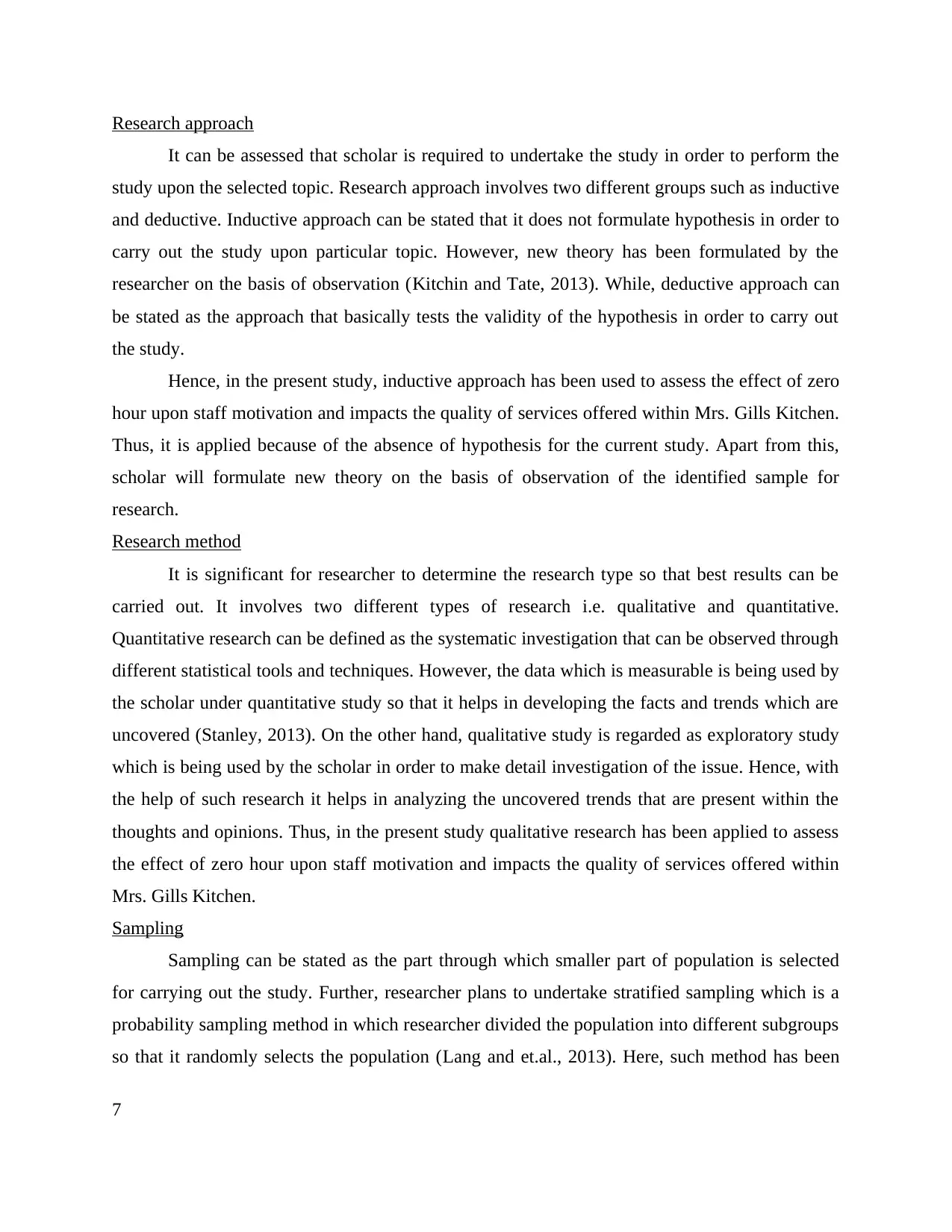
Research approach
It can be assessed that scholar is required to undertake the study in order to perform the
study upon the selected topic. Research approach involves two different groups such as inductive
and deductive. Inductive approach can be stated that it does not formulate hypothesis in order to
carry out the study upon particular topic. However, new theory has been formulated by the
researcher on the basis of observation (Kitchin and Tate, 2013). While, deductive approach can
be stated as the approach that basically tests the validity of the hypothesis in order to carry out
the study.
Hence, in the present study, inductive approach has been used to assess the effect of zero
hour upon staff motivation and impacts the quality of services offered within Mrs. Gills Kitchen.
Thus, it is applied because of the absence of hypothesis for the current study. Apart from this,
scholar will formulate new theory on the basis of observation of the identified sample for
research.
Research method
It is significant for researcher to determine the research type so that best results can be
carried out. It involves two different types of research i.e. qualitative and quantitative.
Quantitative research can be defined as the systematic investigation that can be observed through
different statistical tools and techniques. However, the data which is measurable is being used by
the scholar under quantitative study so that it helps in developing the facts and trends which are
uncovered (Stanley, 2013). On the other hand, qualitative study is regarded as exploratory study
which is being used by the scholar in order to make detail investigation of the issue. Hence, with
the help of such research it helps in analyzing the uncovered trends that are present within the
thoughts and opinions. Thus, in the present study qualitative research has been applied to assess
the effect of zero hour upon staff motivation and impacts the quality of services offered within
Mrs. Gills Kitchen.
Sampling
Sampling can be stated as the part through which smaller part of population is selected
for carrying out the study. Further, researcher plans to undertake stratified sampling which is a
probability sampling method in which researcher divided the population into different subgroups
so that it randomly selects the population (Lang and et.al., 2013). Here, such method has been
7
It can be assessed that scholar is required to undertake the study in order to perform the
study upon the selected topic. Research approach involves two different groups such as inductive
and deductive. Inductive approach can be stated that it does not formulate hypothesis in order to
carry out the study upon particular topic. However, new theory has been formulated by the
researcher on the basis of observation (Kitchin and Tate, 2013). While, deductive approach can
be stated as the approach that basically tests the validity of the hypothesis in order to carry out
the study.
Hence, in the present study, inductive approach has been used to assess the effect of zero
hour upon staff motivation and impacts the quality of services offered within Mrs. Gills Kitchen.
Thus, it is applied because of the absence of hypothesis for the current study. Apart from this,
scholar will formulate new theory on the basis of observation of the identified sample for
research.
Research method
It is significant for researcher to determine the research type so that best results can be
carried out. It involves two different types of research i.e. qualitative and quantitative.
Quantitative research can be defined as the systematic investigation that can be observed through
different statistical tools and techniques. However, the data which is measurable is being used by
the scholar under quantitative study so that it helps in developing the facts and trends which are
uncovered (Stanley, 2013). On the other hand, qualitative study is regarded as exploratory study
which is being used by the scholar in order to make detail investigation of the issue. Hence, with
the help of such research it helps in analyzing the uncovered trends that are present within the
thoughts and opinions. Thus, in the present study qualitative research has been applied to assess
the effect of zero hour upon staff motivation and impacts the quality of services offered within
Mrs. Gills Kitchen.
Sampling
Sampling can be stated as the part through which smaller part of population is selected
for carrying out the study. Further, researcher plans to undertake stratified sampling which is a
probability sampling method in which researcher divided the population into different subgroups
so that it randomly selects the population (Lang and et.al., 2013). Here, such method has been
7
Paraphrase This Document
Need a fresh take? Get an instant paraphrase of this document with our AI Paraphraser
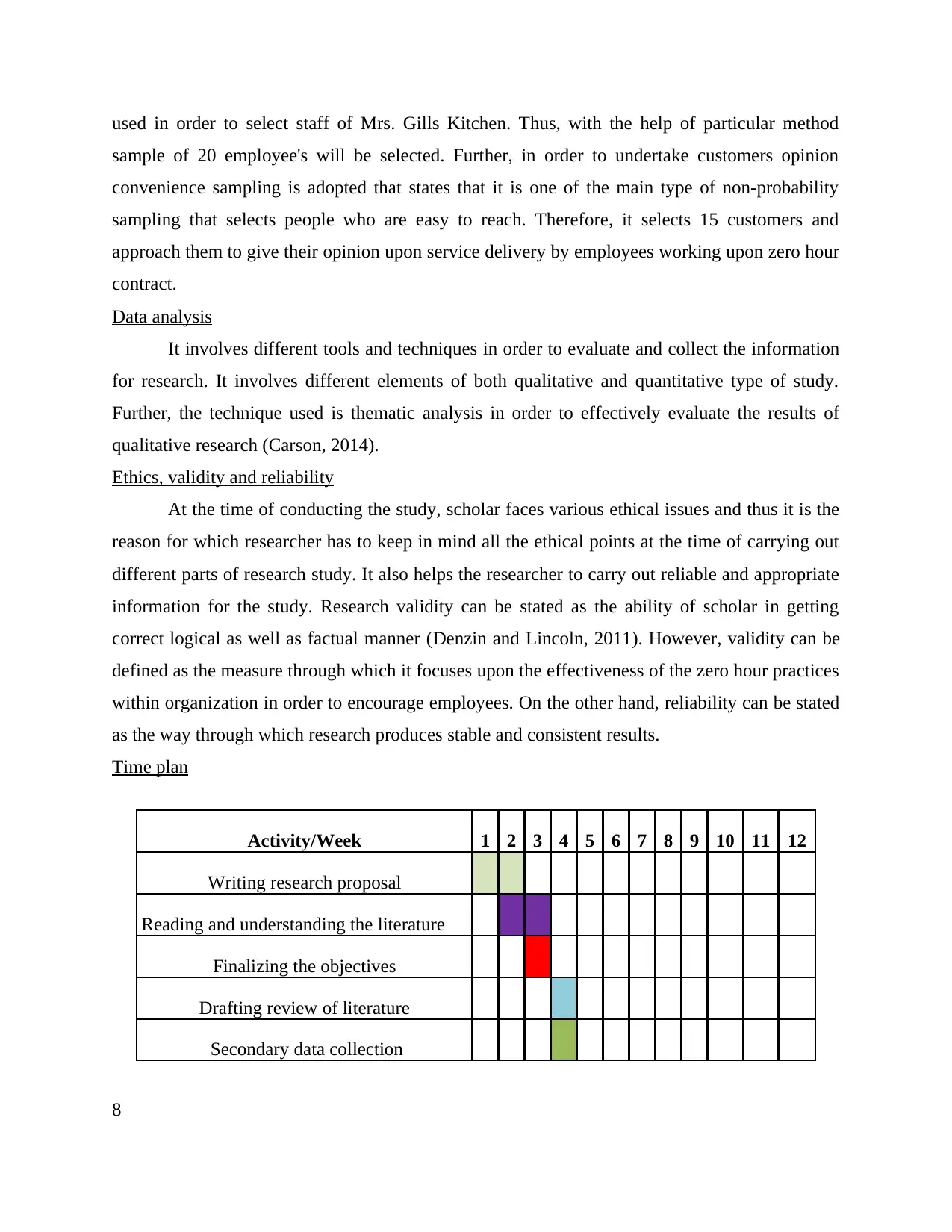
used in order to select staff of Mrs. Gills Kitchen. Thus, with the help of particular method
sample of 20 employee's will be selected. Further, in order to undertake customers opinion
convenience sampling is adopted that states that it is one of the main type of non-probability
sampling that selects people who are easy to reach. Therefore, it selects 15 customers and
approach them to give their opinion upon service delivery by employees working upon zero hour
contract.
Data analysis
It involves different tools and techniques in order to evaluate and collect the information
for research. It involves different elements of both qualitative and quantitative type of study.
Further, the technique used is thematic analysis in order to effectively evaluate the results of
qualitative research (Carson, 2014).
Ethics, validity and reliability
At the time of conducting the study, scholar faces various ethical issues and thus it is the
reason for which researcher has to keep in mind all the ethical points at the time of carrying out
different parts of research study. It also helps the researcher to carry out reliable and appropriate
information for the study. Research validity can be stated as the ability of scholar in getting
correct logical as well as factual manner (Denzin and Lincoln, 2011). However, validity can be
defined as the measure through which it focuses upon the effectiveness of the zero hour practices
within organization in order to encourage employees. On the other hand, reliability can be stated
as the way through which research produces stable and consistent results.
Time plan
Activity/Week 1 2 3 4 5 6 7 8 9 10 11 12
Writing research proposal
Reading and understanding the literature
Finalizing the objectives
Drafting review of literature
Secondary data collection
8
sample of 20 employee's will be selected. Further, in order to undertake customers opinion
convenience sampling is adopted that states that it is one of the main type of non-probability
sampling that selects people who are easy to reach. Therefore, it selects 15 customers and
approach them to give their opinion upon service delivery by employees working upon zero hour
contract.
Data analysis
It involves different tools and techniques in order to evaluate and collect the information
for research. It involves different elements of both qualitative and quantitative type of study.
Further, the technique used is thematic analysis in order to effectively evaluate the results of
qualitative research (Carson, 2014).
Ethics, validity and reliability
At the time of conducting the study, scholar faces various ethical issues and thus it is the
reason for which researcher has to keep in mind all the ethical points at the time of carrying out
different parts of research study. It also helps the researcher to carry out reliable and appropriate
information for the study. Research validity can be stated as the ability of scholar in getting
correct logical as well as factual manner (Denzin and Lincoln, 2011). However, validity can be
defined as the measure through which it focuses upon the effectiveness of the zero hour practices
within organization in order to encourage employees. On the other hand, reliability can be stated
as the way through which research produces stable and consistent results.
Time plan
Activity/Week 1 2 3 4 5 6 7 8 9 10 11 12
Writing research proposal
Reading and understanding the literature
Finalizing the objectives
Drafting review of literature
Secondary data collection
8
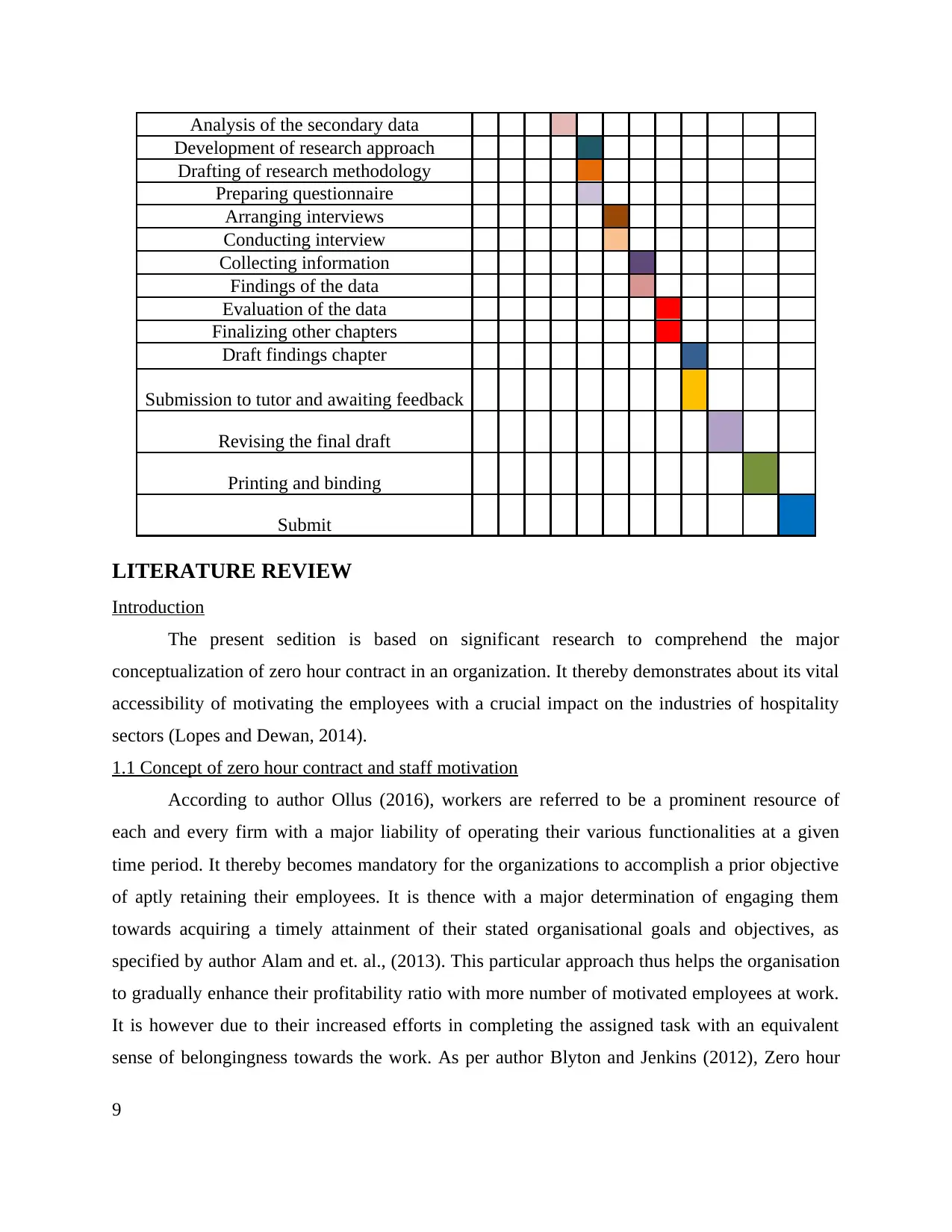
Analysis of the secondary data
Development of research approach
Drafting of research methodology
Preparing questionnaire
Arranging interviews
Conducting interview
Collecting information
Findings of the data
Evaluation of the data
Finalizing other chapters
Draft findings chapter
Submission to tutor and awaiting feedback
Revising the final draft
Printing and binding
Submit
LITERATURE REVIEW
Introduction
The present sedition is based on significant research to comprehend the major
conceptualization of zero hour contract in an organization. It thereby demonstrates about its vital
accessibility of motivating the employees with a crucial impact on the industries of hospitality
sectors (Lopes and Dewan, 2014).
1.1 Concept of zero hour contract and staff motivation
According to author Ollus (2016), workers are referred to be a prominent resource of
each and every firm with a major liability of operating their various functionalities at a given
time period. It thereby becomes mandatory for the organizations to accomplish a prior objective
of aptly retaining their employees. It is thence with a major determination of engaging them
towards acquiring a timely attainment of their stated organisational goals and objectives, as
specified by author Alam and et. al., (2013). This particular approach thus helps the organisation
to gradually enhance their profitability ratio with more number of motivated employees at work.
It is however due to their increased efforts in completing the assigned task with an equivalent
sense of belongingness towards the work. As per author Blyton and Jenkins (2012), Zero hour
9
Development of research approach
Drafting of research methodology
Preparing questionnaire
Arranging interviews
Conducting interview
Collecting information
Findings of the data
Evaluation of the data
Finalizing other chapters
Draft findings chapter
Submission to tutor and awaiting feedback
Revising the final draft
Printing and binding
Submit
LITERATURE REVIEW
Introduction
The present sedition is based on significant research to comprehend the major
conceptualization of zero hour contract in an organization. It thereby demonstrates about its vital
accessibility of motivating the employees with a crucial impact on the industries of hospitality
sectors (Lopes and Dewan, 2014).
1.1 Concept of zero hour contract and staff motivation
According to author Ollus (2016), workers are referred to be a prominent resource of
each and every firm with a major liability of operating their various functionalities at a given
time period. It thereby becomes mandatory for the organizations to accomplish a prior objective
of aptly retaining their employees. It is thence with a major determination of engaging them
towards acquiring a timely attainment of their stated organisational goals and objectives, as
specified by author Alam and et. al., (2013). This particular approach thus helps the organisation
to gradually enhance their profitability ratio with more number of motivated employees at work.
It is however due to their increased efforts in completing the assigned task with an equivalent
sense of belongingness towards the work. As per author Blyton and Jenkins (2012), Zero hour
9
⊘ This is a preview!⊘
Do you want full access?
Subscribe today to unlock all pages.

Trusted by 1+ million students worldwide
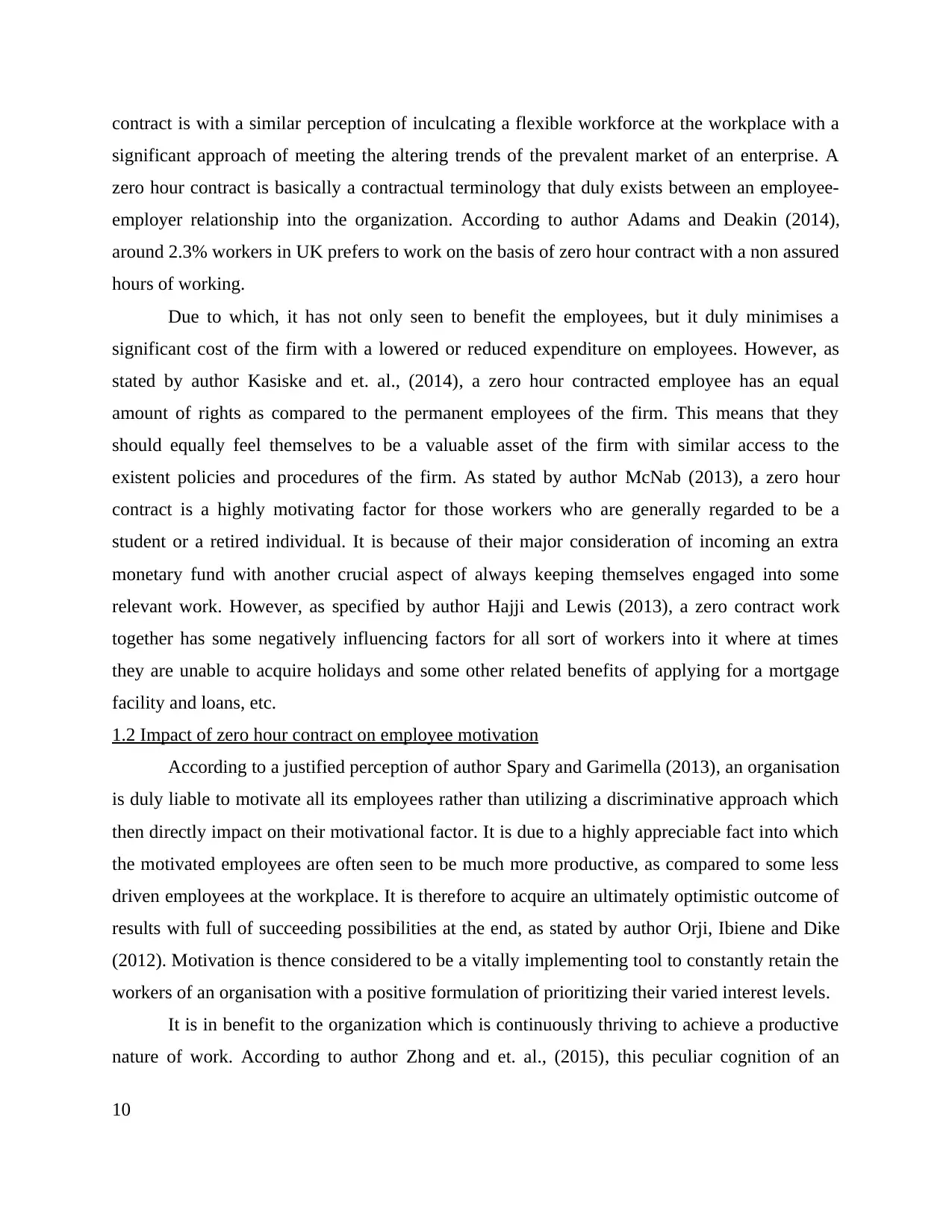
contract is with a similar perception of inculcating a flexible workforce at the workplace with a
significant approach of meeting the altering trends of the prevalent market of an enterprise. A
zero hour contract is basically a contractual terminology that duly exists between an employee-
employer relationship into the organization. According to author Adams and Deakin (2014),
around 2.3% workers in UK prefers to work on the basis of zero hour contract with a non assured
hours of working.
Due to which, it has not only seen to benefit the employees, but it duly minimises a
significant cost of the firm with a lowered or reduced expenditure on employees. However, as
stated by author Kasiske and et. al., (2014), a zero hour contracted employee has an equal
amount of rights as compared to the permanent employees of the firm. This means that they
should equally feel themselves to be a valuable asset of the firm with similar access to the
existent policies and procedures of the firm. As stated by author McNab (2013), a zero hour
contract is a highly motivating factor for those workers who are generally regarded to be a
student or a retired individual. It is because of their major consideration of incoming an extra
monetary fund with another crucial aspect of always keeping themselves engaged into some
relevant work. However, as specified by author Hajji and Lewis (2013), a zero contract work
together has some negatively influencing factors for all sort of workers into it where at times
they are unable to acquire holidays and some other related benefits of applying for a mortgage
facility and loans, etc.
1.2 Impact of zero hour contract on employee motivation
According to a justified perception of author Spary and Garimella (2013), an organisation
is duly liable to motivate all its employees rather than utilizing a discriminative approach which
then directly impact on their motivational factor. It is due to a highly appreciable fact into which
the motivated employees are often seen to be much more productive, as compared to some less
driven employees at the workplace. It is therefore to acquire an ultimately optimistic outcome of
results with full of succeeding possibilities at the end, as stated by author Orji, Ibiene and Dike
(2012). Motivation is thence considered to be a vitally implementing tool to constantly retain the
workers of an organisation with a positive formulation of prioritizing their varied interest levels.
It is in benefit to the organization which is continuously thriving to achieve a productive
nature of work. According to author Zhong and et. al., (2015), this peculiar cognition of an
10
significant approach of meeting the altering trends of the prevalent market of an enterprise. A
zero hour contract is basically a contractual terminology that duly exists between an employee-
employer relationship into the organization. According to author Adams and Deakin (2014),
around 2.3% workers in UK prefers to work on the basis of zero hour contract with a non assured
hours of working.
Due to which, it has not only seen to benefit the employees, but it duly minimises a
significant cost of the firm with a lowered or reduced expenditure on employees. However, as
stated by author Kasiske and et. al., (2014), a zero hour contracted employee has an equal
amount of rights as compared to the permanent employees of the firm. This means that they
should equally feel themselves to be a valuable asset of the firm with similar access to the
existent policies and procedures of the firm. As stated by author McNab (2013), a zero hour
contract is a highly motivating factor for those workers who are generally regarded to be a
student or a retired individual. It is because of their major consideration of incoming an extra
monetary fund with another crucial aspect of always keeping themselves engaged into some
relevant work. However, as specified by author Hajji and Lewis (2013), a zero contract work
together has some negatively influencing factors for all sort of workers into it where at times
they are unable to acquire holidays and some other related benefits of applying for a mortgage
facility and loans, etc.
1.2 Impact of zero hour contract on employee motivation
According to a justified perception of author Spary and Garimella (2013), an organisation
is duly liable to motivate all its employees rather than utilizing a discriminative approach which
then directly impact on their motivational factor. It is due to a highly appreciable fact into which
the motivated employees are often seen to be much more productive, as compared to some less
driven employees at the workplace. It is therefore to acquire an ultimately optimistic outcome of
results with full of succeeding possibilities at the end, as stated by author Orji, Ibiene and Dike
(2012). Motivation is thence considered to be a vitally implementing tool to constantly retain the
workers of an organisation with a positive formulation of prioritizing their varied interest levels.
It is in benefit to the organization which is continuously thriving to achieve a productive
nature of work. According to author Zhong and et. al., (2015), this peculiar cognition of an
10
Paraphrase This Document
Need a fresh take? Get an instant paraphrase of this document with our AI Paraphraser
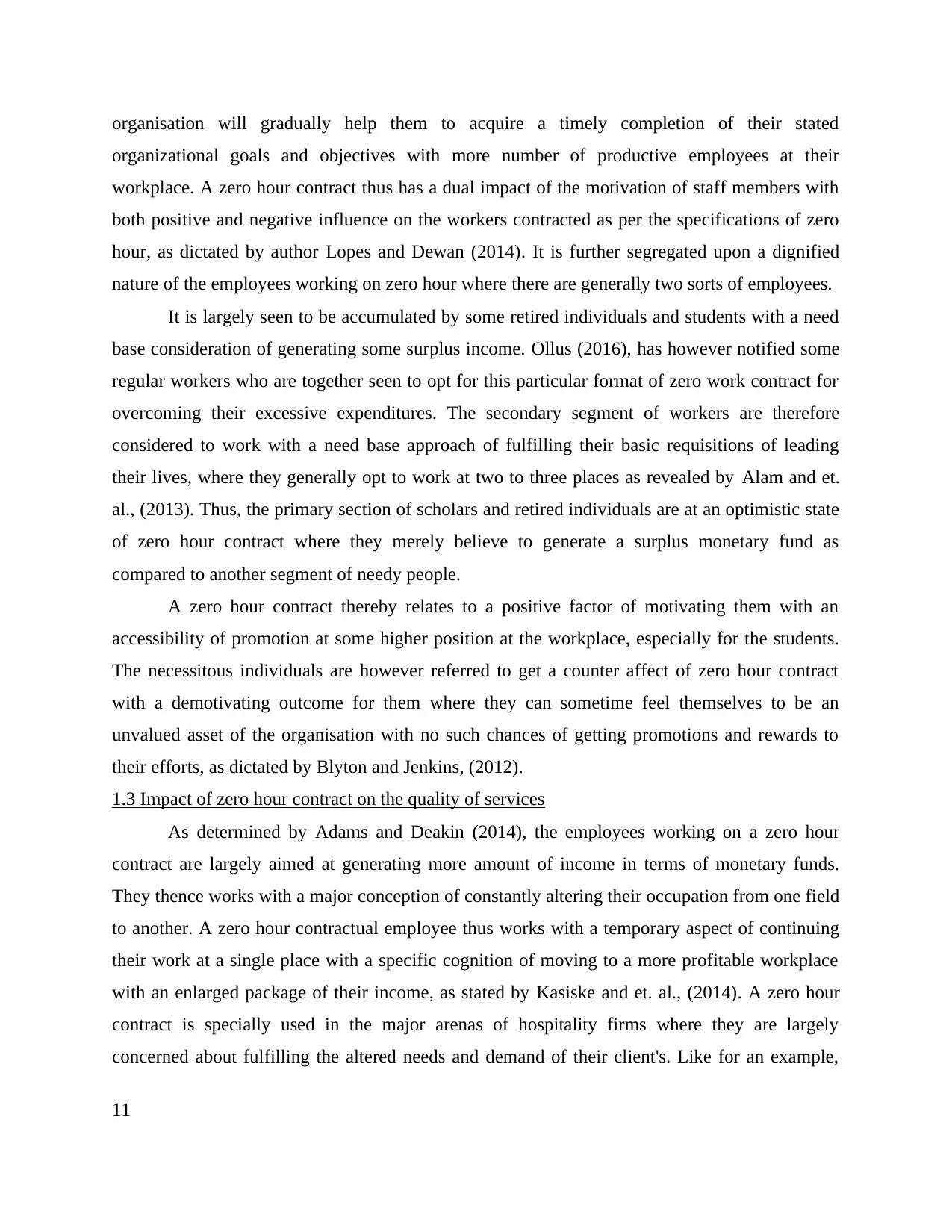
organisation will gradually help them to acquire a timely completion of their stated
organizational goals and objectives with more number of productive employees at their
workplace. A zero hour contract thus has a dual impact of the motivation of staff members with
both positive and negative influence on the workers contracted as per the specifications of zero
hour, as dictated by author Lopes and Dewan (2014). It is further segregated upon a dignified
nature of the employees working on zero hour where there are generally two sorts of employees.
It is largely seen to be accumulated by some retired individuals and students with a need
base consideration of generating some surplus income. Ollus (2016), has however notified some
regular workers who are together seen to opt for this particular format of zero work contract for
overcoming their excessive expenditures. The secondary segment of workers are therefore
considered to work with a need base approach of fulfilling their basic requisitions of leading
their lives, where they generally opt to work at two to three places as revealed by Alam and et.
al., (2013). Thus, the primary section of scholars and retired individuals are at an optimistic state
of zero hour contract where they merely believe to generate a surplus monetary fund as
compared to another segment of needy people.
A zero hour contract thereby relates to a positive factor of motivating them with an
accessibility of promotion at some higher position at the workplace, especially for the students.
The necessitous individuals are however referred to get a counter affect of zero hour contract
with a demotivating outcome for them where they can sometime feel themselves to be an
unvalued asset of the organisation with no such chances of getting promotions and rewards to
their efforts, as dictated by Blyton and Jenkins, (2012).
1.3 Impact of zero hour contract on the quality of services
As determined by Adams and Deakin (2014), the employees working on a zero hour
contract are largely aimed at generating more amount of income in terms of monetary funds.
They thence works with a major conception of constantly altering their occupation from one field
to another. A zero hour contractual employee thus works with a temporary aspect of continuing
their work at a single place with a specific cognition of moving to a more profitable workplace
with an enlarged package of their income, as stated by Kasiske and et. al., (2014). A zero hour
contract is specially used in the major arenas of hospitality firms where they are largely
concerned about fulfilling the altered needs and demand of their client's. Like for an example,
11
organizational goals and objectives with more number of productive employees at their
workplace. A zero hour contract thus has a dual impact of the motivation of staff members with
both positive and negative influence on the workers contracted as per the specifications of zero
hour, as dictated by author Lopes and Dewan (2014). It is further segregated upon a dignified
nature of the employees working on zero hour where there are generally two sorts of employees.
It is largely seen to be accumulated by some retired individuals and students with a need
base consideration of generating some surplus income. Ollus (2016), has however notified some
regular workers who are together seen to opt for this particular format of zero work contract for
overcoming their excessive expenditures. The secondary segment of workers are therefore
considered to work with a need base approach of fulfilling their basic requisitions of leading
their lives, where they generally opt to work at two to three places as revealed by Alam and et.
al., (2013). Thus, the primary section of scholars and retired individuals are at an optimistic state
of zero hour contract where they merely believe to generate a surplus monetary fund as
compared to another segment of needy people.
A zero hour contract thereby relates to a positive factor of motivating them with an
accessibility of promotion at some higher position at the workplace, especially for the students.
The necessitous individuals are however referred to get a counter affect of zero hour contract
with a demotivating outcome for them where they can sometime feel themselves to be an
unvalued asset of the organisation with no such chances of getting promotions and rewards to
their efforts, as dictated by Blyton and Jenkins, (2012).
1.3 Impact of zero hour contract on the quality of services
As determined by Adams and Deakin (2014), the employees working on a zero hour
contract are largely aimed at generating more amount of income in terms of monetary funds.
They thence works with a major conception of constantly altering their occupation from one field
to another. A zero hour contractual employee thus works with a temporary aspect of continuing
their work at a single place with a specific cognition of moving to a more profitable workplace
with an enlarged package of their income, as stated by Kasiske and et. al., (2014). A zero hour
contract is specially used in the major arenas of hospitality firms where they are largely
concerned about fulfilling the altered needs and demand of their client's. Like for an example,
11
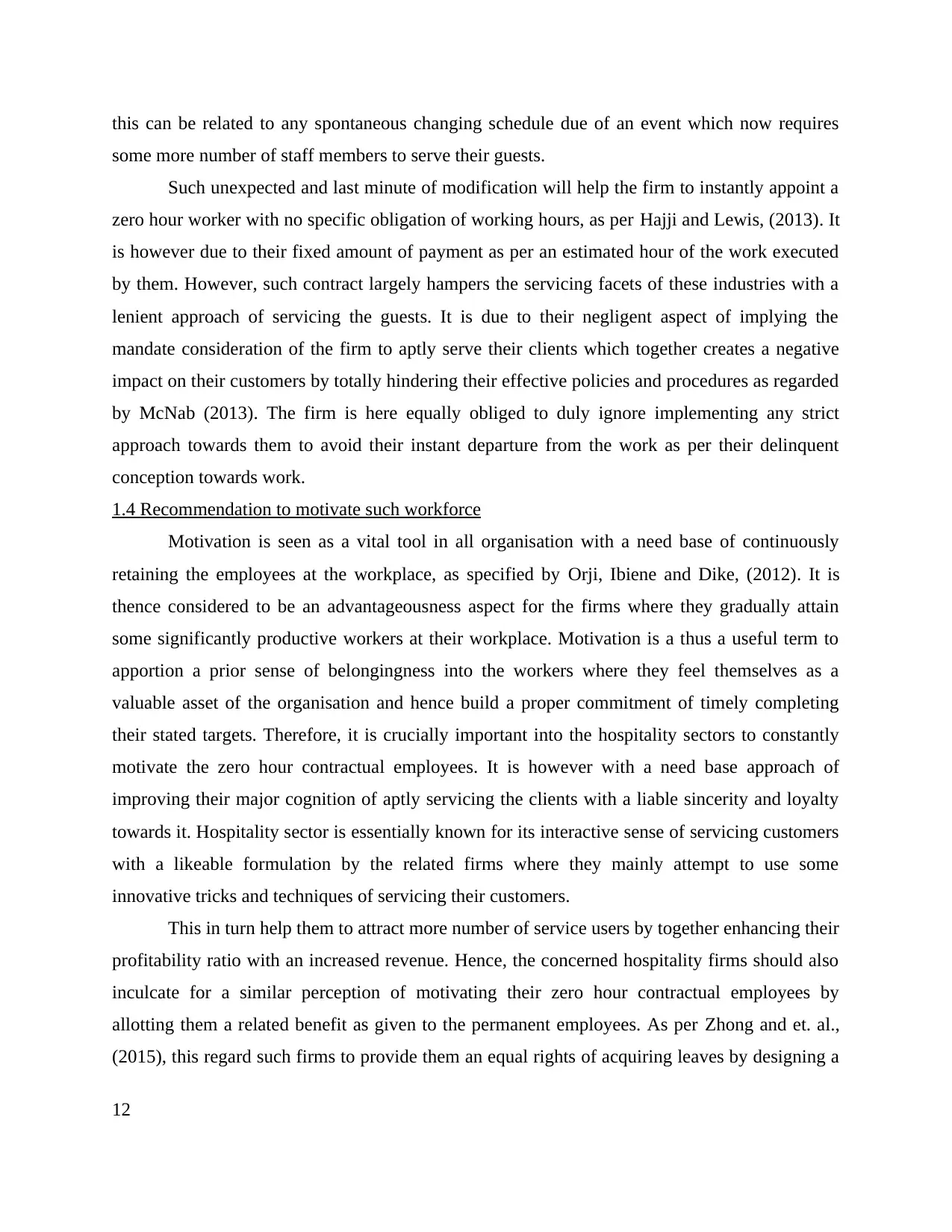
this can be related to any spontaneous changing schedule due of an event which now requires
some more number of staff members to serve their guests.
Such unexpected and last minute of modification will help the firm to instantly appoint a
zero hour worker with no specific obligation of working hours, as per Hajji and Lewis, (2013). It
is however due to their fixed amount of payment as per an estimated hour of the work executed
by them. However, such contract largely hampers the servicing facets of these industries with a
lenient approach of servicing the guests. It is due to their negligent aspect of implying the
mandate consideration of the firm to aptly serve their clients which together creates a negative
impact on their customers by totally hindering their effective policies and procedures as regarded
by McNab (2013). The firm is here equally obliged to duly ignore implementing any strict
approach towards them to avoid their instant departure from the work as per their delinquent
conception towards work.
1.4 Recommendation to motivate such workforce
Motivation is seen as a vital tool in all organisation with a need base of continuously
retaining the employees at the workplace, as specified by Orji, Ibiene and Dike, (2012). It is
thence considered to be an advantageousness aspect for the firms where they gradually attain
some significantly productive workers at their workplace. Motivation is a thus a useful term to
apportion a prior sense of belongingness into the workers where they feel themselves as a
valuable asset of the organisation and hence build a proper commitment of timely completing
their stated targets. Therefore, it is crucially important into the hospitality sectors to constantly
motivate the zero hour contractual employees. It is however with a need base approach of
improving their major cognition of aptly servicing the clients with a liable sincerity and loyalty
towards it. Hospitality sector is essentially known for its interactive sense of servicing customers
with a likeable formulation by the related firms where they mainly attempt to use some
innovative tricks and techniques of servicing their customers.
This in turn help them to attract more number of service users by together enhancing their
profitability ratio with an increased revenue. Hence, the concerned hospitality firms should also
inculcate for a similar perception of motivating their zero hour contractual employees by
allotting them a related benefit as given to the permanent employees. As per Zhong and et. al.,
(2015), this regard such firms to provide them an equal rights of acquiring leaves by designing a
12
some more number of staff members to serve their guests.
Such unexpected and last minute of modification will help the firm to instantly appoint a
zero hour worker with no specific obligation of working hours, as per Hajji and Lewis, (2013). It
is however due to their fixed amount of payment as per an estimated hour of the work executed
by them. However, such contract largely hampers the servicing facets of these industries with a
lenient approach of servicing the guests. It is due to their negligent aspect of implying the
mandate consideration of the firm to aptly serve their clients which together creates a negative
impact on their customers by totally hindering their effective policies and procedures as regarded
by McNab (2013). The firm is here equally obliged to duly ignore implementing any strict
approach towards them to avoid their instant departure from the work as per their delinquent
conception towards work.
1.4 Recommendation to motivate such workforce
Motivation is seen as a vital tool in all organisation with a need base of continuously
retaining the employees at the workplace, as specified by Orji, Ibiene and Dike, (2012). It is
thence considered to be an advantageousness aspect for the firms where they gradually attain
some significantly productive workers at their workplace. Motivation is a thus a useful term to
apportion a prior sense of belongingness into the workers where they feel themselves as a
valuable asset of the organisation and hence build a proper commitment of timely completing
their stated targets. Therefore, it is crucially important into the hospitality sectors to constantly
motivate the zero hour contractual employees. It is however with a need base approach of
improving their major cognition of aptly servicing the clients with a liable sincerity and loyalty
towards it. Hospitality sector is essentially known for its interactive sense of servicing customers
with a likeable formulation by the related firms where they mainly attempt to use some
innovative tricks and techniques of servicing their customers.
This in turn help them to attract more number of service users by together enhancing their
profitability ratio with an increased revenue. Hence, the concerned hospitality firms should also
inculcate for a similar perception of motivating their zero hour contractual employees by
allotting them a related benefit as given to the permanent employees. As per Zhong and et. al.,
(2015), this regard such firms to provide them an equal rights of acquiring leaves by designing a
12
⊘ This is a preview!⊘
Do you want full access?
Subscribe today to unlock all pages.

Trusted by 1+ million students worldwide
1 out of 15
Your All-in-One AI-Powered Toolkit for Academic Success.
+13062052269
info@desklib.com
Available 24*7 on WhatsApp / Email
![[object Object]](/_next/static/media/star-bottom.7253800d.svg)
Unlock your academic potential
Copyright © 2020–2026 A2Z Services. All Rights Reserved. Developed and managed by ZUCOL.


